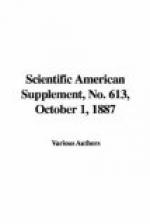Here it might seem as if we had outstepped the boundaries of chemistry, and had to do with phenomena purely vital. But recent research indicated that this was not the case, and pointed to the conclusion that the microscopist must again give way to the chemist, and that it was by chemical rather than biological investigation that the causes of diseases would be discovered, and the power of removing them obtained. For we learned that the symptoms of infective diseases were no more due to the microbes which constituted the infection than alcoholic intoxication was produced by the yeast cell, but that these symptoms were due to the presence of definite chemical compounds, the result of the life of these microscopic organisms. So it was to the action of these poisonous substances formed during the life of the organism, rather than to that of the organism itself, that the special characteristics of the disease were to be traced, for it had been shown that the disease could be communicated by such poisons in the entire absence of living organisms.
Had time permitted, he would have wished to have illustrated the dependence of industrial success upon original investigation, and to have pointed out the prodigious strides which chemical industry in this country had made during the fifty years of her Majesty’s reign. As it was, he must be content to remark how much our modern life, both in its artistic and useful aspects, owed to chemistry, and therefore how essential a knowledge of the principles of the science was to all who had the industrial progress of the country at heart. The country was now beginning to see that if she was to maintain her commercial and industrial supremacy, the education of her people from top to bottom must be carried out on new lines. The question how this could be most safely and surely accomplished was one of transcendent national importance, and the statesman who solved this educational problem would earn the gratitude of generations yet to come.
In welcoming the unprecedentedly large number of foreign men of science who had on this occasion honored the British Association by their presence, he hoped that that meeting might be the commencement of an international scientific organization, the only means nowadays existing of establishing that fraternity among nations from which politics appeared to remove them further and further, by absorbing human powers and human work, and directing them to purposes of destruction. It would indeed be well if Great Britain, which had hitherto taken the lead in so many things that are great and good, should now direct her attention to the furthering of international organizations of a scientific nature. A more appropriate occasion than the present meeting could perhaps hardly be found for the inauguration of such a movement. But whether this hope were realized or not, they all united in that one great object, the search after truth for its own sake, and they all, therefore, might join




